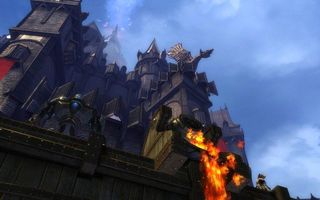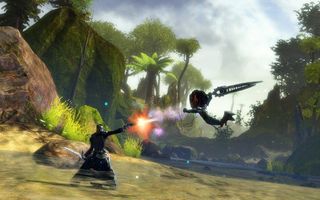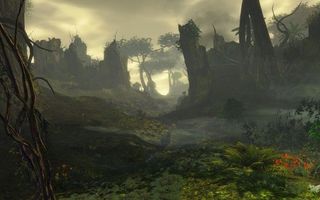Guild Wars 2 preview

Eventually the gate opens, and I receive a gold ranking for my contribution to the fight. This grants an experience bonus as well as karma, a currency earned through events that can be traded for loot later on. This is GW2's replacement for traditional quest rewards. The tutorial builds to an encounter on a scale that most MMOs reserve for their late-game, and one I don't want to spoil.
Three days later, my character wakes up in a land still recovering from the attack. Normally, this is where I'd be given a quest line to start on, or at the very least a crowd of NPCs with icons over their heads. Instead, there's only one: a scout, whose icon is a spyglass. Talking to him boots up the map, and he highlights various hotspots. These are places where adventurers are always needed, and form the breadand- butter of GW2's content. Each of these locations has an NPC in need and a range of tasks that can assist them. In the farmlands around Shaemoor, my only objective is simply to help somebody.
A nearby farmer is having trouble with giant worms. I run around stomping their lairs, sometimes whacking the grubs that emerge to defend them. When I can't find a lair, I pick up bundles of feed and tend to the farmer's cattle: all this contributes to a progress bar, which when filled indicates that I've completed that request. Doing so turns the farmer into a friend, earns me a small pile of coins, and allows me to buy items from him in return for karma.
While I'm at it, the 'new event' notification flashes again. The queen worm has surfaced – a gargantuan creature that I work alongside other players to take down. I'm unable to tell whether my grub-stomping is what caused this event to trigger, and in the hours that follow I see the queen frequently whenever I'm passing by – but there's a tangible sense of moment, albeit one that occurs on a reliable cycle.

Helping out in Shaemoor unlocks the next stage in my personal story, a more traditional quest line that is tied to the choices I made at character creation. As I chose the 'commoner' origin, I'm sent to visit friends in a poor area of the city that subsequently becomes my home instance. These are private areas filled with merchants who can't be found anywhere else, which evolve over time as you progress.
The home instance only takes up a small part of Divinity's Reach, the human capital city. It's a huge circular network of plazas, temples and walkways, populated by dozens of wandering NPCs. It feels like a living city in a way that reminds me of older MMOs, particularly EverQuest – and while it provides convenient access to all of the vendors and trainers you'd expect, there are secrets to be found by wandering around. Popping down a back alley, I encounter four familiar NPCs in the middle of an argument: the descendants of Guild Wars 1's NPC henchmen, squabbling over what adventure to go on next.
Outside the city, I roam the wilds helping out wherever I can. Areas are traversed quickly because there's no way to max them out, and therefore no reason to dwell longer than the current situation requires you to. There will always be events going on, however, and it's difficult to fight the temptation to get involved. Also, your level is lowered to match the area you're in, creating a sense of zones never being truly completed, with the exception of the instanced-off areas in your personal story.
Comic deals, prizes and latest news
Sign up to get the best content of the week, and great gaming deals, as picked by the editors.
These missions operate differently to the class-locked caves and bunkers of The Old Republic. When it needs to, GW2 will teleport you into an instanced version of the area you're currently in so that specific events can take place. Other players and encounters are removed, and straying beyond certain boundaries takes you back to the 'real' world. When I was playing them, these missions often caused the difficulty to spike – but this is likely to be rebalanced before release.

Emerging from one such instance, I found myself in a monastery under attack from shadowy creatures. Joining the fray, I helped a mob of other players to close the portals that had opened in the courtyard. It's impressive how quickly spontaneous adventuring like this becomes par for the course – how oblique and boring waiting for a group suddenly seems when there are battles to be fought everywhere.
ArenaNet aren't worried about throwing players of different skill-levels together and hoping for the best. “I think an MMO needs to accommodate all those different play-styles because it's not like they're different players,” Flannum argues, “it's the same players at different points in time.”
As it turns out, the portal invasion was part of a much longer series of events taking place in a nearby swamp – and one that I almost missed. After the battle I fought solo for a while, killing monsters and rescuing lost explorers. As I was doing this, the group from the monastery were fighting the invasion back to its source. When they did so, an announcement echoed across the zone – “the beast has awakened!”
Off in the distance, I saw something moving through the trees – something big. Emerging in a shallow part of the swamp, I found 20 or so players engaged in a raid-sized fight with the Shadow Behemoth, an enormous half-submerged skeleton that dug its talons into the mud and summoned monster-spewing portals all around us. Without waiting for permission, I waded in. As a melee class, there was little I could do against the monster itself, so I set myself to closing portals and protecting the spellcasters. I had unlocked the ability to place a banner that increased the critical hit chance of my allies, so I used this to boost the damage output of a group of ranged characters who were using guns and bows to attack the beast's head. Eventually we brought its skull crashing to the ground, where I and the other melee warriors were able to smash it to pieces.
Joining in 2011, Chris made his start with PC Gamer turning beautiful trees into magazines, first as a writer and later as deputy editor. Once PCG's reluctant MMO champion , his discovery of Dota 2 in 2012 led him to much darker, stranger places. In 2015, Chris became the editor of PC Gamer Pro, overseeing our online coverage of competitive gaming and esports. He left in 2017, and can be now found making games and recording the Crate & Crowbar podcast.
Most Popular



